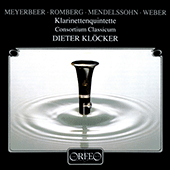
Andreas Jakob Romberg (1767 - 1821)
The violinist Andreas Jakob Romberg enjoyed an early career as a child virtuoso, appearing with his father and his uncle, and the latter’s son, the cellist Bernhard Heinrich Romberg. He continued his concert career after the dissolution of the court musical establishment of the Archbishop-Elector of Cologne in Bonn, where he had known Beethoven. In 1801 he settled in Hamburg, but eventually political and economic circumstances obliged him to take employment as court Kapellmeister in Gotha, where he succeeded Spohr.
Vocal and Instrumental Music
As a composer Romberg profited from the early example of Beethoven, the teaching of the latter’s mentor Neefe, and meetings with Haydn. He wrote sacred and secular vocal music, a few stage works, symphonies, overtures and concertos, the last including around 20 such works for the violin. His chamber music includes quintets and quartets, some involving the use of the flute or the clarinet.
















